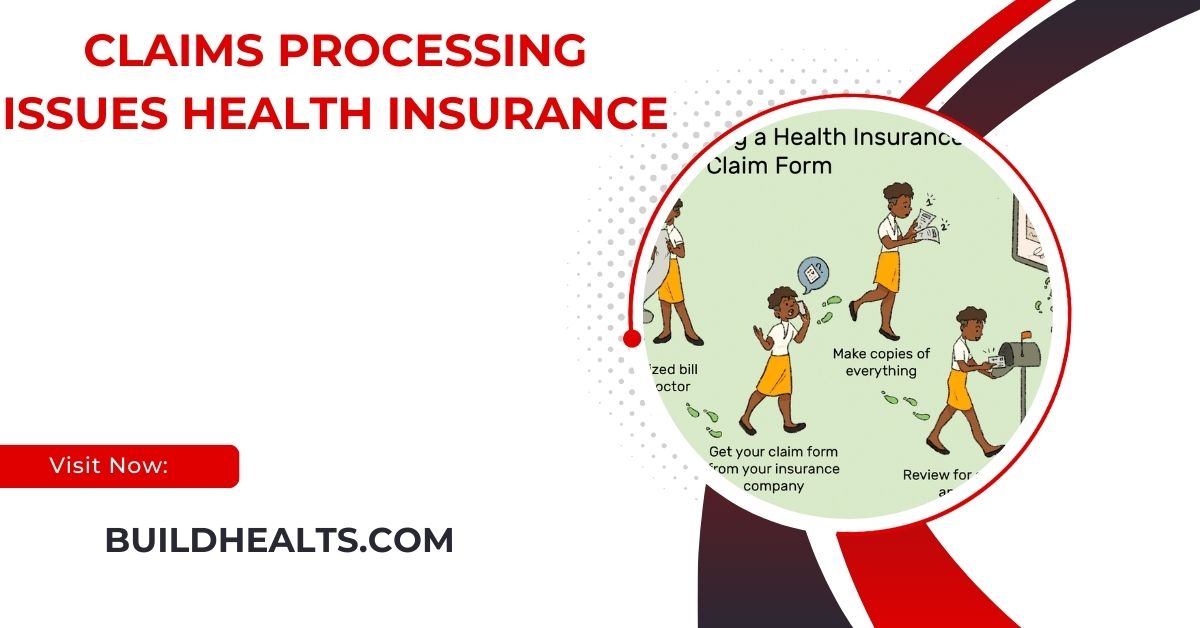Claims processing issues in health insurance include denials, delays, and lack of transparency. Effective communication and record-keeping can help resolve these problems.
This article will explore what claims processing issues are, common problems faced by policyholders, and ways to resolve these issues effectively.
Understanding Health Insurance Claims
What is a Health Insurance Claim?

A health insurance claim is a request made by a policyholder or healthcare provider to an insurance company for payment of medical services. When you receive care, such as a doctor’s visit or surgery, the healthcare provider submits a claim to your insurance company. The insurance company then reviews the claim and decides how much they will pay based on your policy coverage.
Why Are Claims Important?
Claims are essential because they determine how much you owe for medical services. If the claim is processed correctly, your insurance will cover a portion of the costs, and you will only have to pay a co-payment or deductible. However, when issues arise during the claims process, it can lead to delays in payment and unexpected out-of-pocket expenses.
Common Claims Processing Issues:
Claim Denials:
Claim denials occur when the insurance company refuses to pay for a service. This can happen for various reasons, such as:
- Coverage Issues: The service may not be covered under your plan.
- Lack of Medical Necessity: The insurer might believe the treatment was not necessary.
- Incomplete Information: If the claim form is missing details, it can be denied.
Claim denials can be frustrating, but they can often be appealed.
Delayed Payments:
Delays in processing claims can lead to significant problems for both patients and providers. Some common reasons for delays include:
- High Volume of Claims: Insurance companies may face a backlog, especially during peak periods.
- Errors in Claims Submission: Mistakes in the claim form can lead to delays as the insurer seeks clarification.
- Additional Information Requests: Insurers may request more information from the healthcare provider, causing delays in payment.
Underpayments:
Underpayment occurs when the insurance company pays less than expected for a covered service. Reasons for underpayments can include:
- Incorrect Fee Schedule: The insurance company may have a different rate for services than expected.
- Billing Errors: Errors in billing can lead to lower payments.
- Policy Limits: Your plan may have limits on certain types of services or treatments.
Lack of Transparency:
Many policyholders find it challenging to understand the claims process and what their insurance covers. Lack of transparency can lead to confusion about:
- Coverage Limits: Policyholders may not know the extent of their coverage.
- Deductibles and Co-Payments: Understanding how much they must pay out of pocket can be unclear.
- Claims Process: The steps involved in filing a claim may not be straightforward.
Inadequate Customer Support:
Some insurance companies provide poor customer service when addressing claims processing issues. Customers may struggle to get answers to their questions or find it challenging to reach representatives. This can lead to frustration and a lack of resolution for ongoing claims issues.
Also read: Atrius Health Login – Your Comprehensive Guide To Accessing Health Information!
How to Address Claims Processing Issues:
Review Your Insurance Policy:
Start by thoroughly reviewing your health insurance policy to understand what services are covered and any limits on your coverage. Knowing the details of the claims process will help you identify potential issues when claims are submitted. This understanding empowers you to navigate any problems more effectively, reducing the risk of unexpected denials.
Keep Detailed Records:
Maintaining organized records of your medical care and insurance claims is essential for effective claims management. Keep receipts for all medical services, save copies of claim forms submitted, and document all communication with your insurance company. Accurate records will be invaluable if you need to appeal a claim denial or resolve any payment issues in the future.
Communicate with Your Healthcare Provider:

If you encounter issues with a claim, contact your healthcare provider’s office for assistance. They can confirm whether the claim was submitted correctly and clarify what services are covered under your plan. If there were any billing errors, your provider can help correct them, ensuring a smoother claims process for your healthcare needs.
Contact Your Insurance Company:
If you face claims processing issues, it’s crucial to contact your insurance company directly. Gather all relevant information, including your policy number and claim details, before reaching out. Clearly explain the issue, ask questions for clarification, and request a review if a claim is denied or underpaid to understand the reasons behind the decision.
File an Appeal:
If your claim is denied, you have the right to appeal the decision. Begin by writing a letter to your insurance company, clearly stating why you believe the claim should be approved. Include any supporting documentation that strengthens your case. After submitting your appeal, follow up with the insurer to ensure it is being reviewed.
Seek Help from a Consumer Advocate:
If you cannot resolve claims processing issues on your own, consider seeking assistance from a consumer advocate or health insurance ombudsman. They can provide valuable guidance and support in navigating the claims process and help advocate for your rights. Their expertise can significantly improve your chances of resolving complex claims issues effectively.
Also read: What Does A Boad Of Health C Mean – A Complete Guide!
Preventing Future Claims Processing Issues:
Stay Informed About Your Plan:
To prevent future claims processing issues, stay updated on your health insurance plan. Regularly check for any changes to your coverage, particularly during open enrollment periods. Understanding your benefits, coverage limits, and any updates helps you make informed decisions about your healthcare, reducing the likelihood of unexpected problems or denied claims down the line.
Ask Questions Before Treatment:

Before undergoing any medical procedure or treatment, ask your healthcare provider about the costs and coverage under your insurance plan. Inquire about what services are covered and any out-of-pocket expenses you might incur. This proactive approach ensures that you have a clear understanding of your financial responsibilities, helping you avoid surprises and claim issues later on.
Use In-Network Providers:
Using in-network providers is an effective way to minimize claims processing issues. In-network providers have agreements with insurance companies, which often leads to smoother claims processing and fewer delays. By choosing in-network healthcare professionals, you ensure that your claims are more likely to be submitted correctly and paid promptly, reducing the risk of complications.
Monitor Your Claims:
Regularly monitor the status of your claims to stay informed about their progress. If you notice any delays or discrepancies, address them promptly with your insurance company or healthcare provider. Proactively checking your claims helps ensure timely payment, allows you to resolve any issues before they escalate, and keeps your healthcare management on track.
FAQ’s
1. What does it mean to file a health insurance claim?
A health insurance claim is a request for payment made by a policyholder or healthcare provider to an insurance company for medical services received.
2. Why do claims get denied?
Claims can be denied due to reasons such as coverage issues, lack of medical necessity, or incomplete information on the claim form.
3. What should I do if my claim is denied?
If your claim is denied, you can appeal the decision by writing a letter to your insurance company, explaining why you believe the claim should be approved and providing supporting documentation.
4. How can I prevent claims processing issues?
To prevent issues, stay informed about your health insurance plan, ask questions before treatment, use in-network providers, and regularly monitor the status of your claims.
5. What steps should I take if I face delayed payments?
If you experience delayed payments, contact your insurance company to inquire about the status of your claim, check for any errors, and provide any additional information they may need to process your claim.
Conclusion
In conclusion, claims processing issues in health insurance can significantly impact both patients and providers. Understanding the claims process and maintaining clear communication with insurance companies and healthcare providers is essential for addressing problems. By staying informed about coverage, keeping detailed records, and knowing how to appeal denials, policyholders can navigate challenges more effectively.




